The following is a guest post from Head of Acquisitions & Processing Denise Gallo.

"Angel mother, I'm coming home" by M.J. Lessur and W. Dexter Smith, published by G. D. Russell & Company, 1863. Music Division, Library of Congress.
Over the past few months, we’ve begun to showcase examples from the Music Division’s rich collection of Civil War sheet music to highlight some anniversaries of events in 1861. The Battle of Gettysburg, of course, would not be fought until 1863, but on July 1, the first day of that encounter, it seems appropriate to spotlight a song that not only ties to it intimately but is also a timeless depiction of what was an everyday occurrence – death on the battlefield.
Among the soldiers in blue who fought on those Pennsylvania farmlands were 16 regiments of infantrymen, one of cavalry and 14 batteries of artillery from Massachusetts. One of these men died in the arms of a comrade, who, the sheet music cover tells us, described the incident in a letter home. “A sweet smile o’erspread his features, his lips moved, and he whispered George, I am dying, tell the boys we shall meet again where parting does not come.” After briefly remembering his childhood, the dying man spoke his final words: “’Angel mother, I’m coming home!’ after which he sunk back to rise no more.”
Was lyricist W. Dexter Smith Jr. the recipient of the letter quoted on the cover of this song? We’re not told. In fact, save for a note explaining that the title memorialized “The last words of a dying soldier at the Battle of Gettysburg,” we’re left to wonder if the song really reflects a true event or if it was meant only as a sentimental parlor piece. Published in Boston, the song clearly lauds the sacrifice of the Bay State’s native sons, but more noteworthy is the copyright deposit date written across the top – August 5, 1863 – demonstrating how in just one month the dreadful events at Gettysburg had been absorbed into popular culture.
